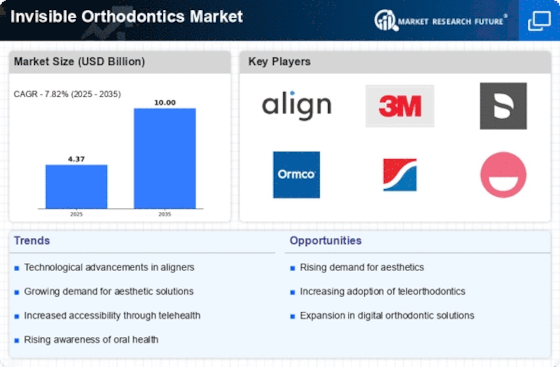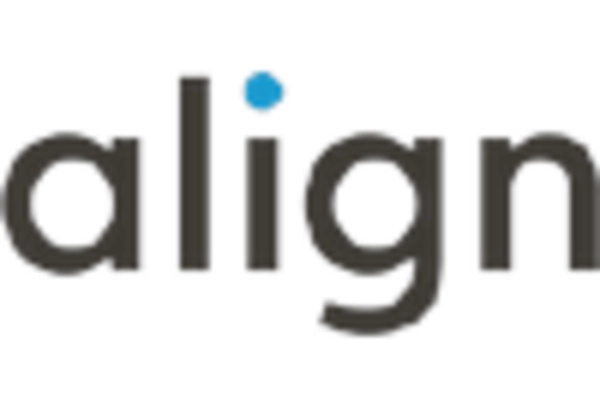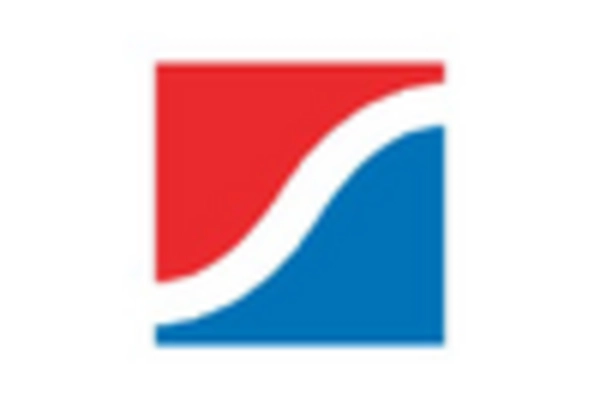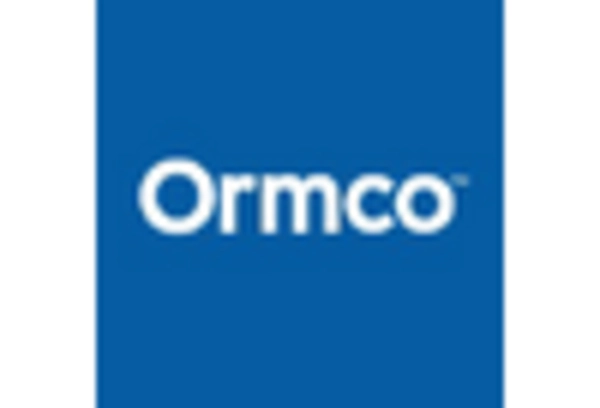Aligners
Lingual Braces
Retainers
Children
Teenagers
Adults
Cosmetic Orthodontics
Functional Orthodontics
Preventive Orthodontics
Online
Dental Clinics
Hospitals
North America
Europe
South America
Asia Pacific
Middle East and Africa
North America Outlook (USD Billion, 2019-2035)
Invisible Orthodontics Market by Product Type
Aligners
Lingual Braces
Retainers
Invisible Orthodontics Market by Age Group Type
Children
Teenagers
Adults
Invisible Orthodontics Market by Treatment Type
Cosmetic Orthodontics
Functional Orthodontics
Preventive Orthodontics
Invisible Orthodontics Market by Distribution Channel Type
Online
Dental Clinics
Hospitals
Invisible Orthodontics Market by Regional Type
US
Canada
US Outlook (USD Billion, 2019-2035)
Invisible Orthodontics Market by Product Type
Aligners
Lingual Braces
Retainers
Invisible Orthodontics Market by Age Group Type
Children
Teenagers
Adults
Invisible Orthodontics Market by Treatment Type
Cosmetic Orthodontics
Functional Orthodontics
Preventive Orthodontics
Invisible Orthodontics Market by Distribution Channel Type
Online
Dental Clinics
Hospitals
CANADA Outlook (USD Billion, 2019-2035)
Invisible Orthodontics Market by Product Type
Aligners
Lingual Braces
Retainers
Invisible Orthodontics Market by Age Group Type
Children
Teenagers
Adults
Invisible Orthodontics Market by Treatment Type
Cosmetic Orthodontics
Functional Orthodontics
Preventive Orthodontics
Invisible Orthodontics Market by Distribution Channel Type
Online
Dental Clinics
Hospitals
Europe Outlook (USD Billion, 2019-2035)
Invisible Orthodontics Market by Product Type
Aligners
Lingual Braces
Retainers
Invisible Orthodontics Market by Age Group Type
Children
Teenagers
Adults
Invisible Orthodontics Market by Treatment Type
Cosmetic Orthodontics
Functional Orthodontics
Preventive Orthodontics
Invisible Orthodontics Market by Distribution Channel Type
Online
Dental Clinics
Hospitals
Invisible Orthodontics Market by Regional Type
Germany
UK
France
Russia
Italy
Spain
Rest of Europe
GERMANY Outlook (USD Billion, 2019-2035)
Invisible Orthodontics Market by Product Type
Aligners
Lingual Braces
Retainers
Invisible Orthodontics Market by Age Group Type
Children
Teenagers
Adults
Invisible Orthodontics Market by Treatment Type
Cosmetic Orthodontics
Functional Orthodontics
Preventive Orthodontics
Invisible Orthodontics Market by Distribution Channel Type
Online
Dental Clinics
Hospitals
UK Outlook (USD Billion, 2019-2035)
Invisible Orthodontics Market by Product Type
Aligners
Lingual Braces
Retainers
Invisible Orthodontics Market by Age Group Type
Children
Teenagers
Adults
Invisible Orthodontics Market by Treatment Type
Cosmetic Orthodontics
Functional Orthodontics
Preventive Orthodontics
Invisible Orthodontics Market by Distribution Channel Type
Online
Dental Clinics
Hospitals
FRANCE Outlook (USD Billion, 2019-2035)
Invisible Orthodontics Market by Product Type
Aligners
Lingual Braces
Retainers
Invisible Orthodontics Market by Age Group Type
Children
Teenagers
Adults
Invisible Orthodontics Market by Treatment Type
Cosmetic Orthodontics
Functional Orthodontics
Preventive Orthodontics
Invisible Orthodontics Market by Distribution Channel Type
Online
Dental Clinics
Hospitals
RUSSIA Outlook (USD Billion, 2019-2035)
Invisible Orthodontics Market by Product Type
Aligners
Lingual Braces
Retainers
Invisible Orthodontics Market by Age Group Type
Children
Teenagers
Adults
Invisible Orthodontics Market by Treatment Type
Cosmetic Orthodontics
Functional Orthodontics
Preventive Orthodontics
Invisible Orthodontics Market by Distribution Channel Type
Online
Dental Clinics
Hospitals
ITALY Outlook (USD Billion, 2019-2035)
Invisible Orthodontics Market by Product Type
Aligners
Lingual Braces
Retainers
Invisible Orthodontics Market by Age Group Type
Children
Teenagers
Adults
Invisible Orthodontics Market by Treatment Type
Cosmetic Orthodontics
Functional Orthodontics
Preventive Orthodontics
Invisible Orthodontics Market by Distribution Channel Type
Online
Dental Clinics
Hospitals
SPAIN Outlook (USD Billion, 2019-2035)
Invisible Orthodontics Market by Product Type
Aligners
Lingual Braces
Retainers
Invisible Orthodontics Market by Age Group Type
Children
Teenagers
Adults
Invisible Orthodontics Market by Treatment Type
Cosmetic Orthodontics
Functional Orthodontics
Preventive Orthodontics
Invisible Orthodontics Market by Distribution Channel Type
Online
Dental Clinics
Hospitals
REST OF EUROPE Outlook (USD Billion, 2019-2035)
Invisible Orthodontics Market by Product Type
Aligners
Lingual Braces
Retainers
Invisible Orthodontics Market by Age Group Type
Children
Teenagers
Adults
Invisible Orthodontics Market by Treatment Type
Cosmetic Orthodontics
Functional Orthodontics
Preventive Orthodontics
Invisible Orthodontics Market by Distribution Channel Type
Online
Dental Clinics
Hospitals
APAC Outlook (USD Billion, 2019-2035)
Invisible Orthodontics Market by Product Type
Aligners
Lingual Braces
Retainers
Invisible Orthodontics Market by Age Group Type
Children
Teenagers
Adults
Invisible Orthodontics Market by Treatment Type
Cosmetic Orthodontics
Functional Orthodontics
Preventive Orthodontics
Invisible Orthodontics Market by Distribution Channel Type
Online
Dental Clinics
Hospitals
Invisible Orthodontics Market by Regional Type
China
India
Japan
South Korea
Malaysia
Thailand
Indonesia
Rest of APAC
CHINA Outlook (USD Billion, 2019-2035)
Invisible Orthodontics Market by Product Type
Aligners
Lingual Braces
Retainers
Invisible Orthodontics Market by Age Group Type
Children
Teenagers
Adults
Invisible Orthodontics Market by Treatment Type
Cosmetic Orthodontics
Functional Orthodontics
Preventive Orthodontics
Invisible Orthodontics Market by Distribution Channel Type
Online
Dental Clinics
Hospitals
INDIA Outlook (USD Billion, 2019-2035)
Invisible Orthodontics Market by Product Type
Aligners
Lingual Braces
Retainers
Invisible Orthodontics Market by Age Group Type
Children
Teenagers
Adults
Invisible Orthodontics Market by Treatment Type
Cosmetic Orthodontics
Functional Orthodontics
Preventive Orthodontics
Invisible Orthodontics Market by Distribution Channel Type
Online
Dental Clinics
Hospitals
JAPAN Outlook (USD Billion, 2019-2035)
Invisible Orthodontics Market by Product Type
Aligners
Lingual Braces
Retainers
Invisible Orthodontics Market by Age Group Type
Children
Teenagers
Adults
Invisible Orthodontics Market by Treatment Type
Cosmetic Orthodontics
Functional Orthodontics
Preventive Orthodontics
Invisible Orthodontics Market by Distribution Channel Type
Online
Dental Clinics
Hospitals
SOUTH KOREA Outlook (USD Billion, 2019-2035)
Invisible Orthodontics Market by Product Type
Aligners
Lingual Braces
Retainers
Invisible Orthodontics Market by Age Group Type
Children
Teenagers
Adults
Invisible Orthodontics Market by Treatment Type
Cosmetic Orthodontics
Functional Orthodontics
Preventive Orthodontics
Invisible Orthodontics Market by Distribution Channel Type
Online
Dental Clinics
Hospitals
MALAYSIA Outlook (USD Billion, 2019-2035)
Invisible Orthodontics Market by Product Type
Aligners
Lingual Braces
Retainers
Invisible Orthodontics Market by Age Group Type
Children
Teenagers
Adults
Invisible Orthodontics Market by Treatment Type
Cosmetic Orthodontics
Functional Orthodontics
Preventive Orthodontics
Invisible Orthodontics Market by Distribution Channel Type
Online
Dental Clinics
Hospitals
THAILAND Outlook (USD Billion, 2019-2035)
Invisible Orthodontics Market by Product Type
Aligners
Lingual Braces
Retainers
Invisible Orthodontics Market by Age Group Type
Children
Teenagers
Adults
Invisible Orthodontics Market by Treatment Type
Cosmetic Orthodontics
Functional Orthodontics
Preventive Orthodontics
Invisible Orthodontics Market by Distribution Channel Type
Online
Dental Clinics
Hospitals
INDONESIA Outlook (USD Billion, 2019-2035)
Invisible Orthodontics Market by Product Type
Aligners
Lingual Braces
Retainers
Invisible Orthodontics Market by Age Group Type
Children
Teenagers
Adults
Invisible Orthodontics Market by Treatment Type
Cosmetic Orthodontics
Functional Orthodontics
Preventive Orthodontics
Invisible Orthodontics Market by Distribution Channel Type
Online
Dental Clinics
Hospitals
REST OF APAC Outlook (USD Billion, 2019-2035)
Invisible Orthodontics Market by Product Type
Aligners
Lingual Braces
Retainers
Invisible Orthodontics Market by Age Group Type
Children
Teenagers
Adults
Invisible Orthodontics Market by Treatment Type
Cosmetic Orthodontics
Functional Orthodontics
Preventive Orthodontics
Invisible Orthodontics Market by Distribution Channel Type
Online
Dental Clinics
Hospitals
South America Outlook (USD Billion, 2019-2035)
Invisible Orthodontics Market by Product Type
Aligners
Lingual Braces
Retainers
Invisible Orthodontics Market by Age Group Type
Children
Teenagers
Adults
Invisible Orthodontics Market by Treatment Type
Cosmetic Orthodontics
Functional Orthodontics
Preventive Orthodontics
Invisible Orthodontics Market by Distribution Channel Type
Online
Dental Clinics
Hospitals
Invisible Orthodontics Market by Regional Type
Brazil
Mexico
Argentina
Rest of South America
BRAZIL Outlook (USD Billion, 2019-2035)
Invisible Orthodontics Market by Product Type
Aligners
Lingual Braces
Retainers
Invisible Orthodontics Market by Age Group Type
Children
Teenagers
Adults
Invisible Orthodontics Market by Treatment Type
Cosmetic Orthodontics
Functional Orthodontics
Preventive Orthodontics
Invisible Orthodontics Market by Distribution Channel Type
Online
Dental Clinics
Hospitals
MEXICO Outlook (USD Billion, 2019-2035)
Invisible Orthodontics Market by Product Type
Aligners
Lingual Braces
Retainers
Invisible Orthodontics Market by Age Group Type
Children
Teenagers
Adults
Invisible Orthodontics Market by Treatment Type
Cosmetic Orthodontics
Functional Orthodontics
Preventive Orthodontics
Invisible Orthodontics Market by Distribution Channel Type
Online
Dental Clinics
Hospitals
ARGENTINA Outlook (USD Billion, 2019-2035)
Invisible Orthodontics Market by Product Type
Aligners
Lingual Braces
Retainers
Invisible Orthodontics Market by Age Group Type
Children
Teenagers
Adults
Invisible Orthodontics Market by Treatment Type
Cosmetic Orthodontics
Functional Orthodontics
Preventive Orthodontics
Invisible Orthodontics Market by Distribution Channel Type
Online
Dental Clinics
Hospitals
REST OF SOUTH AMERICA Outlook (USD Billion, 2019-2035)
Invisible Orthodontics Market by Product Type
Aligners
Lingual Braces
Retainers
Invisible Orthodontics Market by Age Group Type
Children
Teenagers
Adults
Invisible Orthodontics Market by Treatment Type
Cosmetic Orthodontics
Functional Orthodontics
Preventive Orthodontics
Invisible Orthodontics Market by Distribution Channel Type
Online
Dental Clinics
Hospitals
MEA Outlook (USD Billion, 2019-2035)
Invisible Orthodontics Market by Product Type
Aligners
Lingual Braces
Retainers
Invisible Orthodontics Market by Age Group Type
Children
Teenagers
Adults
Invisible Orthodontics Market by Treatment Type
Cosmetic Orthodontics
Functional Orthodontics
Preventive Orthodontics
Invisible Orthodontics Market by Distribution Channel Type
Online
Dental Clinics
Hospitals
Invisible Orthodontics Market by Regional Type
GCC Countries
South Africa
Rest of MEA
GCC COUNTRIES Outlook (USD Billion, 2019-2035)
Invisible Orthodontics Market by Product Type
Aligners
Lingual Braces
Retainers
Invisible Orthodontics Market by Age Group Type
Children
Teenagers
Adults
Invisible Orthodontics Market by Treatment Type
Cosmetic Orthodontics
Functional Orthodontics
Preventive Orthodontics
Invisible Orthodontics Market by Distribution Channel Type
Online
Dental Clinics
Hospitals
SOUTH AFRICA Outlook (USD Billion, 2019-2035)
Invisible Orthodontics Market by Product Type
Aligners
Lingual Braces
Retainers
Invisible Orthodontics Market by Age Group Type
Children
Teenagers
Adults
Invisible Orthodontics Market by Treatment Type
Cosmetic Orthodontics
Functional Orthodontics
Preventive Orthodontics
Invisible Orthodontics Market by Distribution Channel Type
Online
Dental Clinics
Hospitals
REST OF MEA Outlook (USD Billion, 2019-2035)
Invisible Orthodontics Market by Product Type
Aligners
Lingual Braces
Retainers
Invisible Orthodontics Market by Age Group Type
Children
Teenagers
Adults
Invisible Orthodontics Market by Treatment Type
Cosmetic Orthodontics
Functional Orthodontics
Preventive Orthodontics
Invisible Orthodontics Market by Distribution Channel Type
Online
Dental Clinics
Hospitals



















Leave a Comment